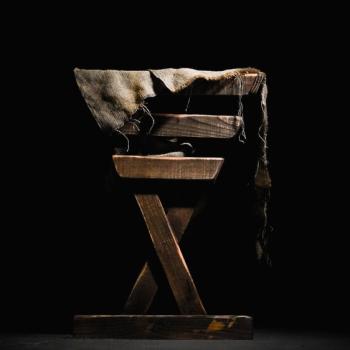[In those days a decree went out from Emperor Augustus that all the world should be registered. This was the first registration and was taken while Quirinius was governor of Syria. All went to their own towns to be registered. Joseph also went from the town of Nazareth in Galilee to Judea, to the city of David called Bethlehem, because he was descended from the house and family of David. He went to be registered with Mary, to whom he was engaged and who was expecting a child. While they were there, the time came for her to deliver her child. And she gave birth to her firstborn son and wrapped him in bands of cloth, and laid him in a manger, because there was no place for them in the inn.]
In that region there were shepherds living in the fields, keeping watch over their flock by night. Then an angel of the Lord stood before them, and the glory of the Lord shone around them, and they were terrified. But the angel said to them, “Do not be afraid; for see– I am bringing you good news of great joy for all the people: to you is born this day in the city of David a Savior, who is the Messiah, the Lord. This will be a sign for you: you will find a child wrapped in bands of cloth and lying in a manger.” And suddenly there was with the angel a multitude of the heavenly host, praising God and saying,
“Glory to God in the highest heaven,
and on earth peace among those whom he favors!”
When the angels had left them and gone into heaven, the shepherds said to one another, “Let us go now to Bethlehem and see this thing that has taken place, which the Lord has made known to us.” So they went with haste and found Mary and Joseph, and the child lying in the manger. When they saw this, they made known what had been told them about this child; and all who heard it were amazed at what the shepherds told them. But Mary treasured all these words and pondered them in her heart. The shepherds returned, glorifying and praising God for all they had heard and seen, as it had been told them. (Luke 21-7, 8-20)
I suppose that most – if not all of us – would prefer a Christmas marked by nothing but celebration, peace, and quiet. It’s an understandable desire. I certainly find myself feeling that way.
Frank Sinatra probably captured that sentiment as well as anyone:
Have yourself a merry little ChristmasLet your heart be lightNext year all our troubles, will be out of sight
But, of course, that isn’t possible for any number of people at Christmas. In our own parish alone, there are people who will celebrate their first Christmas without their spouses. There are members who will be in the hospital on Christmas day. There are parents with a child in intensive care. And there are still others who are battling with cancer.
You probably know other people in similar circumstances. I have two friends who are homeless. I have a friend who was just diagnosed with Parkinson’s disease. And another friend who is suffering from a degenerative disease that is steadily robbing him of motor control, while his wife battles cancer. And that’s just a few who come to mind.
When we encounter those experiences at Christmas time, we are tempted to believe that the Christmas story is to blame. We have wrapped so many misplaced and commercialized expectations around the Christmas story that we no longer hear much of what is there.
If we listen carefully to the Christmas story, though, we hear something very different from Sinatra’s song:
We hear that God prepares for the incarnation at the margins of society, calling on two women whose sole qualification is their faith. We hear that Jesus was born under adverse circumstances and without fanfare. We hear that his parents were without a home and without a place to deliver their baby. That Herod, driven by paranoia, was already after Jesus, immediately following his birth. We hear that later Herod would kill as many newborns as he could find in an effort to ensure that Jesus was killed.
In Mary’s prayer, that we know as the Magnificat, we hear that Jesus came into the world to engage in spiritual warfare. To break the hold of death over our lives. To save us from ourselves and the consequences of our desire to be our own gods.
And, of course, because the story of Jesus’s birth is the prelude to that rupture with the past and all that will follow, we learn that Jesus came into the world, not to offer us an annual Hallmark moment, but to die for us.
Please don’t misunderstand. I am not suggesting that when we long for what the lyrics from Sinatra’s song describes that we are stupid – or blind – or just the victims of commercialization. That longing is a completely understandable response to loss, pain, fear, and disappointment. What I am trying to suggest, is that the Christmas story and all that follows it in the Gospel is the story of God coming alongside of us in the middle of that longing. Jesus is “Immanuel”, “God with us, in it, all the way.”
He isn’t just here in the good times. The peaceful times. The pleasant times. He is with us, to rescue us, and embraces the difficult times. And there is no barrier between us and him. Not illness or crushing loss. Not infertility, miscarriage, divorce, familial conflict and alienation, job loss or any of the hundred and one other setbacks in life. And not that dark barrier that we all experience, death itself.
But that is not all that the Christmas story tells us.
The other feature of the story is that God is at work, in our lives and in our world. The Tiberiuses of our day can conduct their surveys, make their plans, and promise their own version of peace. Rome and its power brokers – who are far from the story – can do their worst. Herod, who is more immediately involved can plot and scheme.
But the Christmas story treats all of that as the chaos in the background. The birth of Jesus and the rescue of our souls is the work of God. And God will do what God chooses to do.
God doesn’t need political leaders to achieve his ends. Come to that, God doesn’t need religious leaders if they won’t listen. He doesn’t need to shape the arc of history, so that it bends to justice.
He doesn’t even need the help of those who are sympathetic to his plan. As the story of the Gospel suggests, none of those things are a factor in the story of Jesus’s birth. And by the time he is crucified, they will all have turned against him or run away – even those who followed him.
But God does invite us into his life, his care, his embrace. Now, in the middle of even the difficult times. As John says, he calls us friends. As Paul notes, we are baptized into his life. And in Christ, we are brothers and sisters.
Once we realize this, our pain will not necessarily disappear. We will continue to face loneliness, illness, the loss of loved ones, and ultimately, death. But we will face them in strength and hope. Because in the coming of the Son, God has acted. And he will not be defeated in his effort to find and deliver us.
So, this day we celebrate alongside Jesus, God’s Son, our Savior. He sits alongside us. He is the author of our salvation and the Host of the feast. He shares in both our tears and our joys. He is with us today and he will be with us in all our tomorrows.
“Glory to God in the highest heaven,
and on earth peace among those whom he favors!”
Merry Christmas!
The image is by Sadao Watanabe














